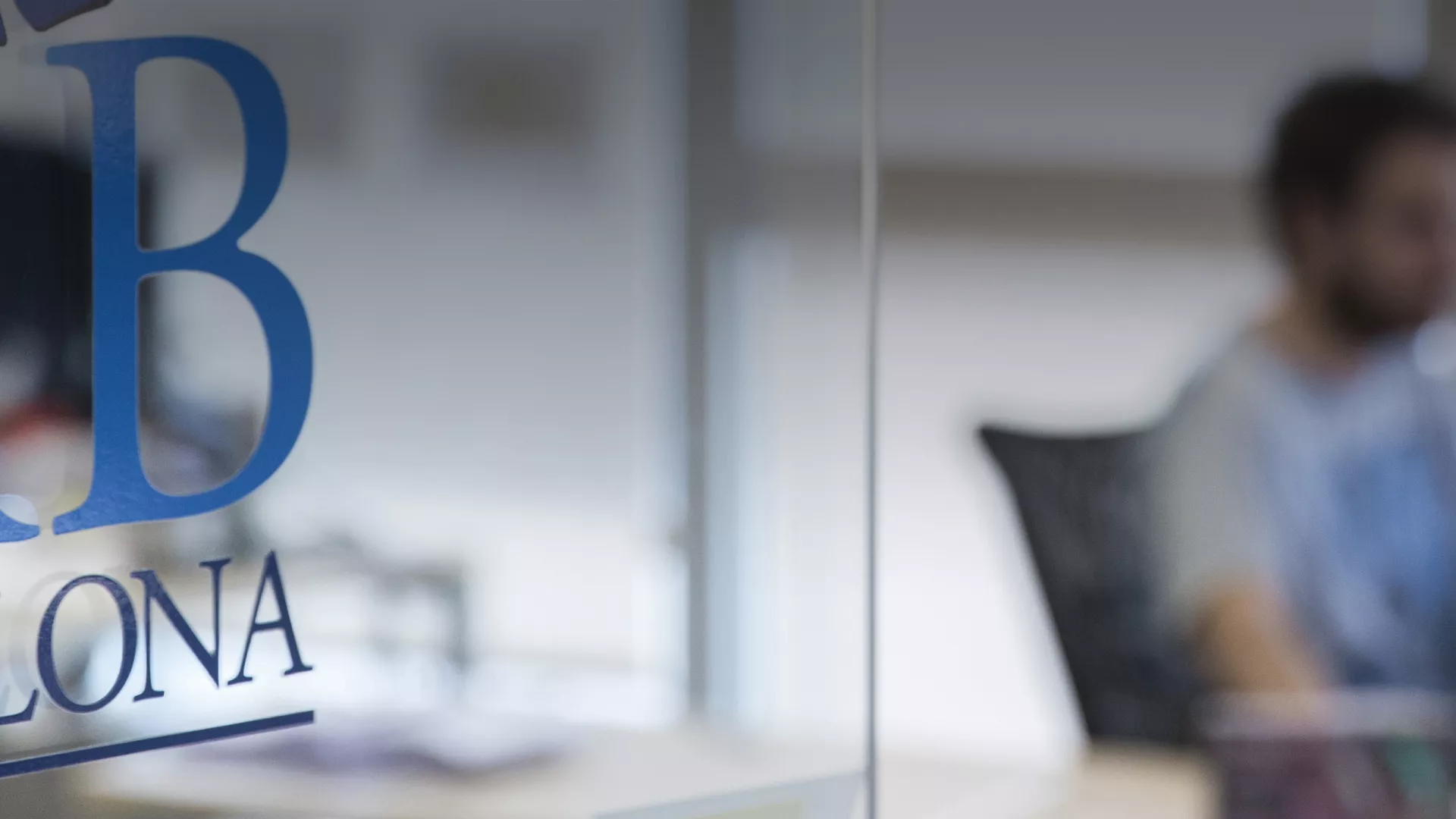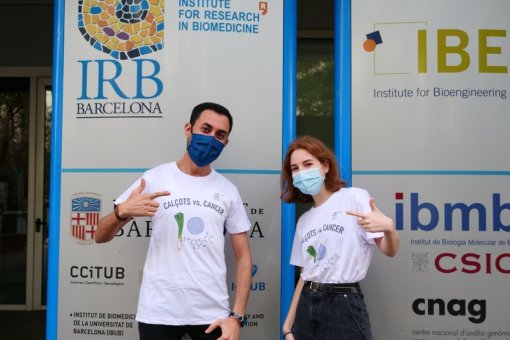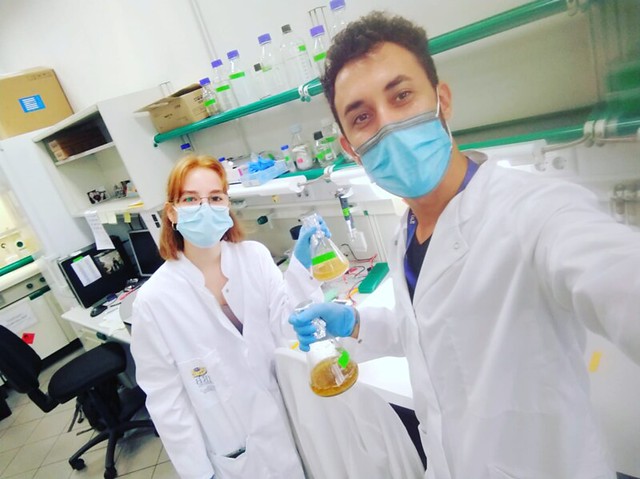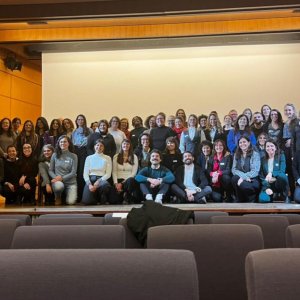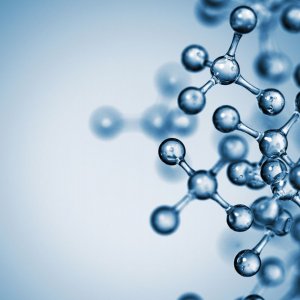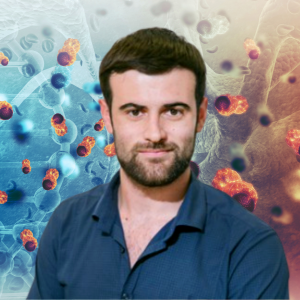In a constantly changing world, with new viruses, such as COVID-19, research plays a pivotal role in finding solutions. Ariadna Sanchis, a 17-year-old student from the Institut Olorda in Sant Feliu de Llobregat (Barcelona) wanted to take her first steps in research, and did just that by doing her sixth-form research project in the biomedical research programme Crazy About Biomedicine, run by the Fundació Catalunya-La Pedrera and IRB Barcelona.
“Ever since I was a kid, I have dreamed about becoming a scientist. Going to the Science Museum was one of the things I most enjoyed. Understanding how our bodies function and how things can turn into different ones by themselves through some kind of reaction was and still is something amazing to learn,” she says enthusiastically. Her ambition led her to join the Crazy About Biomedicine Programme at IRB Barcelona, where she was assigned Dr. Mohamed Abdelsalam as her tutor.
Dr. Abdelsalam, a PROBIST Marie Curie Postdoctoral Researcher working in Dr. Jordi Casanova’s lab and is a tenure track lecturer of Pharmacognosy at the Faculty of Pharmacy, Delta University for Science and Technology (Egypt), came up with the project idea, namely the anticancer activity of calçot crude extracts, which Ariadna found exciting. Calçots are a type of green onion very popular in Catalonia. Calçots are milder and less bulbous than onions.
“We immediately clicked scientifically after our brainstorming discussion to start working together on her research project,” says Dr. Abdelsalam of Ariadna. “She is a mass of energy and motivation. She is always active and curious about new challenges and never gives up!”.
To put this line of research into context, the annual Calçotada, a tradition in Catalonia celebrating the calçot harvest, involves grilling the plants over hot embers and then peeling away the charred outer skins with your hands before dipping them in a delicious sauce and eating them. The popularity of this tradition is reflected by the sales of millions of these onion-type plants each year in Catalonia.
The project
The project aimed to test the anticancer properties of crude extract of calçots on cancer cell lines. To get better informed, Ariadna read articles proposed by her tutor and learnt about how healthy cells can become cancerous, and a little bit of the history of the calçot and its active ingredients, and about flavonoids and their properties.
Under the complicated scenario of lockdown, Ariadna’s determination to carry out her work reaped rewards. She received full marks for the project and was also selected to participate and present her project in a contest called "14è Fòrum de Treballs de Recerca".
Findings
Comparing the results with the National Cancer Institute (NCI) guidelines on the inhibitory concentration (IC50) of plant extracts revealed that crude calçot extract showed significant anticancer activity against treated cancer cells compared to the non-treated ones.
“We were interested in testing the extracts of the edible and non-edible parts (the waste of peelings) of the plant separately. Surprisingly, the results revealed that the extract of the non-edible parts of the plant showed higher anticancer activity than that of the edible part, alone and in combination with Doxorubicin as a standard positive control anticancer drug,” she explains. Although an IC50 of a plant extract lower than 20 μg/mL is considered highly cytotoxic according to the NCI, Ariadna observed a noticeable difference between using Doxorubicin alone or in combination with the calçot extract, the latter approach having synergistic effects.
“This finding indicates that combining natural products with conventional chemotherapeutic agents may reduce their toxicity by allowing a reduction in dose. Calçots are rich in flavonoids, which have antioxidant properties, so we believe that the flavonoid content contributes to the anticancer activity exerted by this plant,” she concludes.
Indeed, Ariadna and Dr. Abdelsalam believe that the major bioactive phytochemicals of the waste skin of calçots should be examined in future studies and compared with those present in the edible part of the plant. “Such studies would not only pave the way for the future consideration of natural products in cancer therapies but also benefit the environment by recycling waste products. Indeed, thousands of kilos of the non-edible part that is peeled off the plant are thrown away each year. To the best of our knowledge, this is the first report on testing the biological activity of calçot extracts as anticancer substances,” they say.
Both Dr. Abdelsalam and Ariadna have taken away positive experiences from the Crazy about Biomedicine Programme. “This experience was one of the best things that ever happened to me! I loved going to the lab, putting on my lab coat and working on our hypothesis, observing things and most of all learning a lot. Dr. Abdelsalam has been such a nice tutor and he has taught me tips and basic knowledge on how to work in the lab. Research is an amazing tool for progress and for making people’s lives safer,” says Ariadna.
The tutor’s experience is no less enthusiastic. “After my experience with Ariadna, I really recommend postdocs and senior researchers to give the opportunity to young, motivated research juniors to fulfil their passion in research,” says Dr. Abdelsalam.
Innovaspain, a reference medium to follow innovative Spanish news, has recently published an article on this beautiful story. Read it here!
